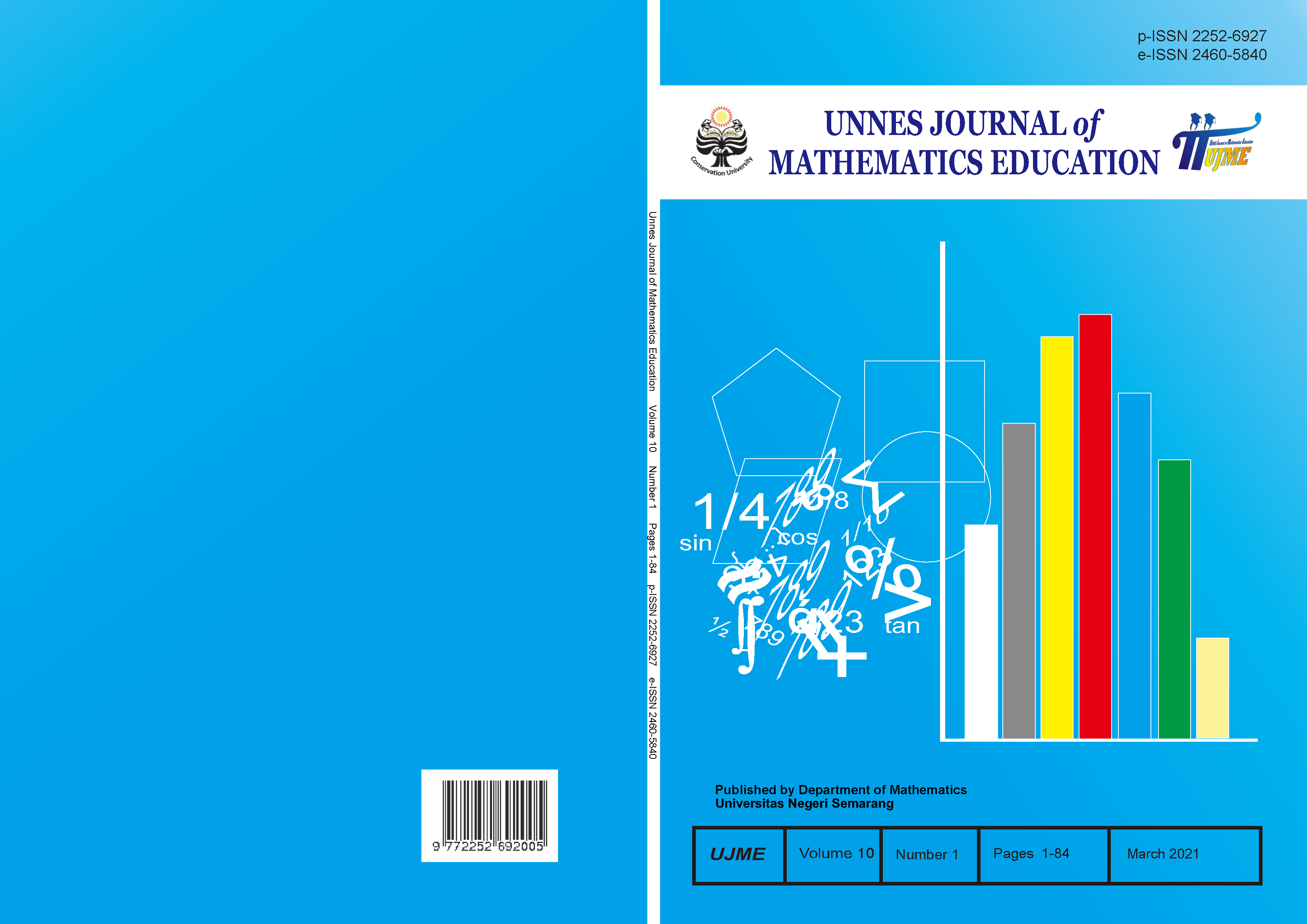Students' mathematical communication skill in co-op co-op type of cooperative learning model reviewed by productive disposition
##plugins.themes.academic_pro.article.main##
Abstract
The purpose of this study are examine the effectiveness of co-op co-op type of cooperative learning model on the mathematical communication skill of 8th grade students, determine the effect of productive disposition on students' mathematical communication skill in co-op co-op type of cooperative learning model, and describe students' mathematical communication skill reviewed by productive disposition in co-op co-op type of cooperative learning model. The research method used is mixed method. The results showed that: 1) the mathematical communication skill of 8th grade students in co-op co-op type of cooperative learning model achieved classical completeness criteria, 2) the average of mathematical communication skill of 8th grade students in the co-op co-op type of cooperative learning model achieved minimum completeness criteria, 3) there is an effect of productive disposition on mathematical communication skill in the co-op type of cooperative learning model, 4) subjects with high productive disposition are able to achieve one indicator well and five indicators are achieved imperfectly. Subjects with medium productive disposition are able to achieve all indicators of mathematical communication skill imperfectly. Subjects with low productive disposition are able to achieve four indicators of mathematical communication skill imperfectly.
##plugins.themes.academic_pro.article.details##
References
Cai, J., Lane S., & Jakabcsin M.S. (1996). The Role of Open Ended Task and Holistic Scoring Rubric: Assessing Students Mathematical Reasoning and Communication in Mathematics, K12 and Beyond. Reston VA: NCTM.
Isjoni. (2013). Cooperative Learning: Improving Communication Intelligence Among Students. Yogyakarta: Learning Library.
Kilpatrick, J., Swafford, J., & Findell, B. (2001). Adding It Up: Helping Children Learn Mathematics. Washington DC: National Academy Press.
Masrukan. (2008). Kemampuan Pemecahan Masalah dan Komunikasi Matematika: Pengaruh Penggunaan Model Pembelajaran dan Asesmen Kinerja Terhadap Kemampuan Pemecahan Masalah dan Kemampuan Komunikasi Matematika. (Disertasi). Universitas Negeri Jakarta, Jakarta.
NCTM. (2000). Principle and Standars for School Mathematic. Virginia: NCTM.
Peraturan Menteri Pendidikan dan Kebudayaan Republik Indonesia Nomor 21 Tahun 2016 TENTANG Standar Isi Pendidikan Dasar dan Menengah.
Qohar, A. (2011). Mathematical Communication: What and How to Develop It in Mathematics Learning? .Proceeding International Seminar and the Fourth National Conference on Mathematics Education 2011 Universitas Negeri Yogyakarta. Yogyakarta.
Ricardo, & Meilani, R. I. (2017). Impak Minat dan Motivasi Belajar Terhadap Hasil Belajar Siswa. Jurnal Pendidikan Manajemen Perkantoran, 2(2), 188-201.
Rochyani, S. A. I. (2015). Meningkatkan Kompetensi Strategis, Penalaran Adaptif, dan Disposisi Produktif Siswa SMA Melalui Concept-Rich Instruction. (Tesis Guru). Universitas Pendidikan Indonesia, Bandung.
Sidik, A., Ramlah, & Utami, M. R.. (2017). Hubungan Antara Self-Confidence Dengan Kemampuan Komunikasi Matematis Siswa SMP. Dalam Prodising Seminar Nasional Matematika dan Pendidikan Matematika (SESIOMADIKA). Karawang.
Slavin, R. E. (2005). Cooperative Learning: Teori, Riset dan Praktik. Bandung: Penerbit Nusa Media.
Widjajanti, D. B. (2011). Mengembangkan Kecakapan Matematis Mahasiswa Calon Guru Matematika Melalui Strategi Perkuliahan Kolaboratif Berbasis Masalah. Prosiding Seminar Nasional Penelitian, Pendidikan dan Penerapan MIPA Universitas Negeri Yogyakarta. Yogyakarta.
Yeshy, Nirawati, R., & Husna, N. (2017). Pengaruh Model Pembelajaran Kooperatif Tipe Cooperative in Education (Co-op Co-op) Terhadap Kemampuan Pemecahan Masalah Matematis Siswa Pada Materi Kubus dan Balok. JPMI (Jurnal Pendidikan Matematika Indonesia), 2(1), 19-26.
Zetriuslita. (2013). Peranan Pembelajaran Berbasis Masalah Dalam Mengembangkan Kemampuan Komunikasi Matematis Siswa Sekolah Menengah. Prespektif Pendidikan dan Keguruan, 4(8), 127-135.
